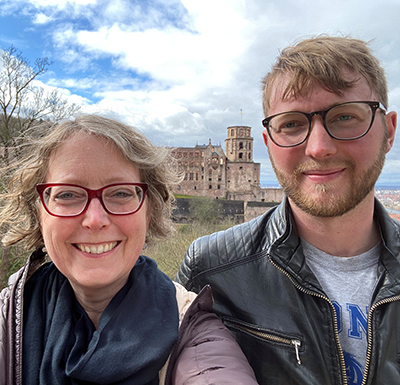May 14, 2025
Small fish, big dreams for Gies iMBA student from Alaska
Katrina Church-Chmielowski providing fishing companies a better sales option
Editor’s Note: Through its Origin Ventures Office of Entrepreneurship, Gies College of Business is supporting entrepreneurial activities of both on-campus and online learners. The Origin Ventures Office fosters knowledge creation and dissemination from top faculty in the field, and it designs and offers the curriculum needed to bring that knowledge to the classroom. The office houses iVenture, an accelerator for top student startups at the University of Illinois, and co-sponsors the Cozad New Venture Challenge which provides University of Illinois startups with an opportunity to compete for a pool of $500,000 in funding. This is one in a series of features on Gies teams participating in this year’s Cozad, which culminates in the finals on April 17. This year, 57 Gies-led teams are participating in the contest, up from seven in 2024.

The fishing season in Alaska is short but can be extremely lucrative. However, currently, fishing boats have few options to sell their catch. Katrina Church-Chmielowski, an iMBA student at Gies College of Business, and her son, Gerek, are hoping to change that.
A native of the 49th state, Katrina graduated from Georgetown University, and has returned to her roots in tiny Copper Center, Alaska, a town of 312 people near the far southeast corner of the state. It’s not uncommon for the family to trek three hours just for pizza. Despite the remote location, Katrina has been able to pursue her MBA through Gies’ world-class online program.
She admits that working in a family business can be tricky, but together they already have started an earth moving company and own an AirBnB property. Now she and Gerek are in the process of starting an Alaska seafood logistics operation to service the fishing companies of Alaska. That’s a big reason why she is pursuing an MBA.
“The Gies MBA program has already had a direct ROI for me,” Katrina said. “I attend class, and the next day I am able to put something into effect in the business. It has been an incredible experience.”
A former teacher at a community college, Katrina works full-time in the state legislature. She cites a Multiculturalism in the Marketplace class taught by Gies professors Maria Rodas and Tina Girndt-Clougherty as being especially relevant to her position with the state.
“That was one of my last classes before I took this legislative job,” she said. “I use it every single day.“
The family’s latest venture had its genesis with Gerek’s experience as a commercial fisherman in Bristol Bay. According to Katrina, the fishing boats’ only real current option is to sell their season’s catch to local canneries. The boats contract with canneries to sell their catch, but they don’t get paid until after the end of the season. The price has been almost the same since the 1980s except a few years back that resulted in pay that was pennies to the dollar in what had normally been received.
Through their contacts in Europe, particularly Latvia and Norway, Katrina believes she can give those companies another viable option.
“I think the market is there,” she said. “Because of the sanctions against Russia, Europe has lost a lot of opportunities to purchase fish. This is one way that we could fill that gap.”
Because of health requirements by the European Union’s version of the FDA, Chmielowski’s company will not be the only middlemen in the chain. They will likely need to work through a wholesaler in Seattle, who will package the fish in a manner acceptable for sale in Europe.
Katrina admits that expanding their reach will likely mean a few trips to Europe to meet with potential wholesalers, but she sees a path for success.
“We have been plugging numbers,” she said. “There are still so many unknowns. Making connections in Europe is the hard part. We have two people on the ground, one in Norway and one in Latvia. They are making connections with chefs and wholesalers, but we don’t have enough wholesalers right now. The shippers in Seattle won’t be able to give us quotes until that part is done.”
In addition to her iMBA courses, Katrina has been getting feedback through a Gies capstone project and is doing the same through the mentoring program of the Cozad New Venture Challenge, which awards more than $500,000 in seed funding to University of Illinois-led startups.
Fishing is in Katrina’s blood. Her parents were commercial fishermen in the 1980s, primarily in halibut. Gerek was a salmon gillnetter during the summer months while going to school. She is hoping to continue that tradition with Gerek, who is finishing a master’s degree in foreign service from Georgetown in May. He plans to connect with other leads in Europe this summer.
“My son would really like to get this off the ground this summer, but I don’t know if we can get all the contracts in place this year,” Katrina said. “However, if we can do the legwork this year, we can have it in place by next summer. The goal would be for him to lead the operations full time.”
In addition to a vested interest in helping the Alaskan fishing community, having a business for Gerek to run is a motivating factor in their ambitious pursuit.
